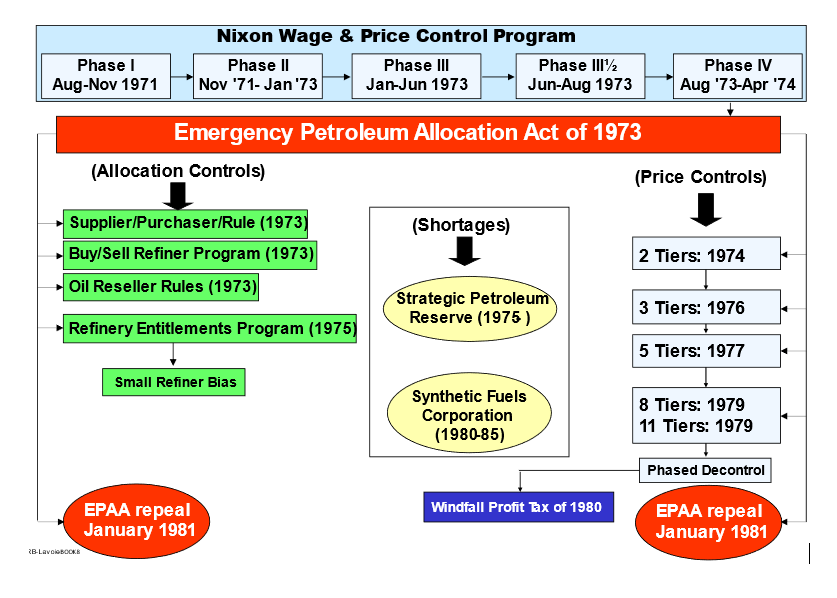[ad_1]
In my earlier publish, I described the results of the oil reseller growth to elucidate why U.S. shoppers paid record-high costs—even approximating the value of world oil—regardless of most worth rules at each transaction level to make sure the other outcome in the course of the oil shortages of the Nineteen Seventies.
Regardless of years of regulatory tailoring and 1000’s of dedicated directors (consolidated within the U.S. Division of Power in 1977), the gasoline traces reappeared in 1979 with oil cutoffs from the Iranian Revolution. Sufficient was sufficient even for President Carter, whose Nationwide Power Plan of two years earlier was in shambles. With assist from Democrats, a phased deregulate invoice was enacted with a windfall revenue tax that was accelerated into full deregulate by President Reagan upon taking workplace in early 1981.
It had been deliberate chaos, to make use of a time period of Ludwig von Mises. The preliminary EPAA rules overlaying 27 pages within the Federal Register can be supplemented by greater than 5,000 pages of amendments in its first two years. Below this regulation, there can be “no fewer than six totally different regulatory businesses and 7 distinct worth management regimes, every successively extra sophisticated and pervasive.”[1]
The unprecedented peacetime train in cumulative intervention went far past the EPAA. Between 1977 and 1980, greater than 300 power payments have been thought-about in Congress. State legislatures thought-about many extra. Earlier than it was over, even probably the most anti-oil politicians had regrets. Senator Edward Kennedy (D-MA) complained concerning the “outrageous weed backyard of regulation.”[2] James Schlesinger, the primary head of the U.S. Division of Power (created in 1977), known as the expertise “the political equal of Chinese language water torture.”[3]
The regulatory tsunami included dozens of state and federal mandates for power conservation. Within the identify of power safety, the Strategic Petroleum Reserve (1975) and the Artificial Fuels Company (1980) have been born, every introducing their very own points and challenges. “Gapism”—regulation, taxation, and subsidization meant to both enhance provide or lower demand—threw good cash after dangerous within the worth controls-shortage program.[4]

Conclusion
In reference to the Nineteen Seventies oil disaster, Milton and Rose Friedman wrote,
The peacetime expertise of oil shortages is a case research of public coverage gone flawed, and predictably so. The excellent news is that most worth controls as an power coverage was pushed from the talk and is a political nonstarter right this moment. The dangerous information is that a lot injury was carried out in a futile quest to plan petroleum from the middle. Moreover, a coverage of “power safety” (in anticipate a 3rd oil shock, the gasoline traces of which might not come with out worth controls) created new bureaucracies and new applications that stay to at the present time.
Historical past issues, and regulatory historical past informs public coverage towards enterprise. By no means once more.
Robert L. Bradley is the founder and CEO of the Institute for Power Analysis.
[1] Joseph P. Kalt, “The Creation, Progress, and Entrenchment of Particular Pursuits in Oil Worth Coverage,” in The Political Economic system of Deregulation: Curiosity Teams within the Regulatory Course of, ed. Roger G. Noll and Bruce Owen (Washington, DC: American Enterprise Institute, 1983), p. 98.
[2] 124 Cong. Rec. S17071 (each day ed. June 9, 1978) (assertion of Sen. Kennedy).
[3] Quoted in Daniel Yergin, The Prize: The Epic Quest for Oil, Cash, and Energy (New York: Simon & Schuster, 1991), p. 659.
[4] Edward Mitchell. U.S. Power Coverage: A Primer (Washington, DC: American Enterprise Institute, 1974), pp. 17–26.
[5] Milton and Rose Friedman, Free to Select (New York: Harcourt Brace Jovanovich, 1979), p. 219.
[ad_2]
Source link





